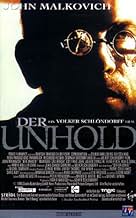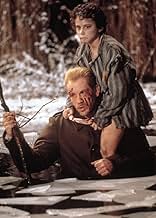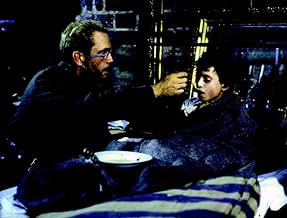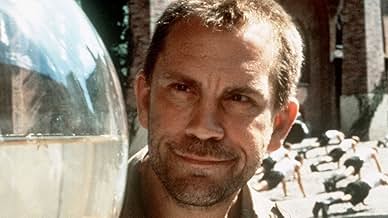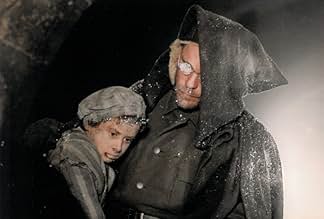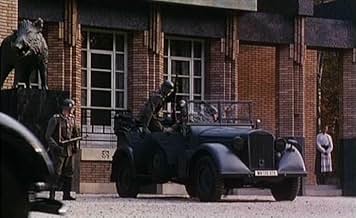Frenchman Abel Tiffauges likes children, and wants to protect them against the grown-ups. Falsely suspected as child molester, he's recruited as a soldier in the 2nd World War, but very soon... Read allFrenchman Abel Tiffauges likes children, and wants to protect them against the grown-ups. Falsely suspected as child molester, he's recruited as a soldier in the 2nd World War, but very soon he is taken prisoner of war. After shortly serving in Goerings hunting lodge, he becomes ... Read allFrenchman Abel Tiffauges likes children, and wants to protect them against the grown-ups. Falsely suspected as child molester, he's recruited as a soldier in the 2nd World War, but very soon he is taken prisoner of war. After shortly serving in Goerings hunting lodge, he becomes the dogsbody in Kaltenborn Castle, an elite training camp for German boys. Completely happ... Read all
- Director
- Writers
- Stars
- Awards
- 1 win & 1 nomination total
- Director
- Writers
- All cast & crew
- Production, box office & more at IMDbPro
Featured reviews
This strange and original work is a French film about Nazi Germany done in English. There are no subtitles. Director Volker Schlondorff is German, the screenplay is by veteran French writer Jean-Claude-Carriere, who has scores of films to his credit including Bell de Jour (1967) and Valmont (1989), and the star is the American, John Malkovich, who plays a French simpleton named Abel Tiffauges who ends up as a servant in Field Marshall Herman Goering's hunting estate during World War II, and then later in a Hitler youth academy for boys.
Malkovich's Abel is enormously sympathetic because he has suffered but harbors no bitterness, because he genuinely loves children, and because he has a certain magic about him based on his childish belief that somehow he will survive any catastrophe. In a boy's home as a child he survives the brutality of a proto Goering-like fat boy, and then later as an auto mechanic he overcomes a false accusation of child molestation. Both of these little stories are vividly rendered and seem entirely realistic. Then begins Abel's war time adventures, and it is here that the story becomes, as some have observed, something of a fairy tale. Abel is able to leave his barracks at the prison to wander about where he meets a blind moose and then a German army officer at a deserted cabin in the woods. This leads to his being established at Goering's hunting estate, and from there to the Hitler youth academy where he is treated as a privileged servant. We see the Nazis as just another part of the bizarre personages of his world.
The depiction of Goering as a kind of self-indulgent Nero, living in opulence as the world burns, seemed entirely believable. The overall portrait of the Germans in an objective and balanced manner was refreshing and thought-provoking and one of the strengths of the film. The Nazi eugenicist is contrasted with the officer who was part of a failed plot against Hitler, both men enormously sincere and dedicated, the one unbalanced, the other unlucky.
This is not a film for those looking primarily to be entertained. This is a work of art, dark, uneven, and a bit curious.
The movie is spanning a few years of time and the rhythm is slow, as one would expect from a film made from a book, and, while a little boring and depressing, it is a nice movie.
Bottom line: imagine Forrest Gump in Europe. No humour, no hope, no cares in the world. Oh, except the war. ;)
A great deal of the film is artfully done, with many subtle displacements to stimulate emotions in the viewer. Although the oft-mentioned 'front line' is never seen, instead we are faced with the massacre of hundreds of wild animals. The childhood friend of Abel returns to him in the form of the military official in the forest, and yet, Abel does not make a connection beyond a vague similarity. He is oblivious to the extravagant decadence of dipping one's hands in jewels, or keeping a wild cat for pleasure. In his simpleton's way he meanders through a landscape of potential knowledge, yet learns nothing. It is the viewer who is given the chance to learn what he can't. Unfortunately, this schema reminded me a bit too much of Forrest Gump. However, the film speaks a great deal to the fairy-tale effects of idealism and propaganda on young children, as finally Abel is cut off by the very boys he loved, their allegiance to a greater unseen force much stronger than their understanding of fellow man.
Did you know
- TriviaGerard Depardieu was slated for the lead role
- GoofsPrior to the school fire, a caption says "Paris 1925". Upon his arrest as an adult, Abel, through his narration, remembers the fire as having happened "twenty years ago". This would place his adult scenes in 1945, but when he joins the French army after his arrest it is before the German occupation of Paris which would place his arrest in 1940. However, Abel is slow-witted and possibly does not have an accurate sense of time.
- Quotes
Count von Kaltenborn: This whole beautiful country, to which we have given our souls, is utterly doomed. It's going to be wiped out of human memory. Our entire heritage, even our name, our ancestors' names, wiped out, all wiped out!
- ConnectionsFeatured in Hollywood Profile: John Malkovich (1998)
- How long is The Ogre?Powered by Alexa
Details
- Release date
- Countries of origin
- Languages
- Also known as
- The Ogre
- Filming locations
- Production companies
- See more company credits at IMDbPro
Box office
- Gross US & Canada
- $50,935
- Gross worldwide
- $50,935
- Runtime
- 1h 58m(118 min)
- Color
- Sound mix
- Aspect ratio
- 1.85 : 1

